As Climate Change Hits Nigeria, Small Scale Women Farmers Count Losses
In Nigeria, smallholder women farmers are facing the most hardship from the effect of climate change. Things may not change soon.

Godwin Susan and Isah Arah Zainab are thousands of miles apart − the former is in Nasarawa State, Northcentral Nigeria, while the latter resides in Zamfara, Northwest − but they are both victims of the impacts of climate change.
As climate change effect hit across Nigeria, Susan, Zainab and other smallholder women farmers bore the brunt.
Nigerian rural women farmers play vital roles in agricultural production and are key to Africa’s most populous country’s food security. They account for 70 per cent of agricultural workers and 80 per cent of food producers.
Nigerian Meteorological Agency (NIMET), the government agency that documents weather and climate data says there is evidence of climate change in Nigeria.
“These pieces of evidence are in the form of rising temperatures, more frequent and persistent heat and cold waves, severe coastal and inland floods and the ravaging wind storms,” the agency said in one of its climate review bulletins.
According to Michael E. Mann, one of the world’s most influential climate scientists, the world has “finally reached the point where it is not credible to deny climate change because people can see it playing out in real-time in front of their eyes.”
Sudden rainfall stop weeks after planting
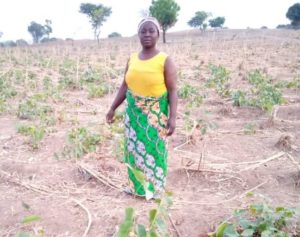
For 13 years, Godwin Susan, 60, has ventured into farming and raised her five children with proceeds from her farm. In her 13 years experience, Godwin says 2020 stood out as one year with losses.
Farmers in her village were happy when the rain started earlier and did not suspect it would stop abruptly. After Susan and others had planted their crops, the rains ceased for five weeks. The COVID-19 pandemic broke out in this period and movement was restricted.
An abrupt stop of rainfall and deadly floods across parts of Nigeria are stark reminders of the climate risks facing Africa’s most populous country. Many states in Nigeria rely on rain-fed agriculture which makes a larger number of small scale holder farmers vulnerable to the negative effects of climate change.
Susan had been cultivating groundnuts, maize, melon and cassava on her different plots of land. The crops died after the rain stopped.
“Melon that we planted early was about to flower when the rain stopped suddenly. It started drying up and eventually died. In fact, there were a lot of losses,” she laments, unable to quantify her losses.
Susan was not unaware of climate change. She knew about planting early and using improved seedlings. What she did not know are its real impacts on farmers like her.
“We have heard about climate change. We were always told to plant earlier and use improved seedlings. We used the improved seedlings and planted earlier but the rain that did not come, made it affect our farms.”
Rising global temperatures, regular flooding and rising water levels are part of the impacts of climate change. With the COVID-19 pandemic, the farmers’ woes were compounded. It was impossible for the troubled women to seek knowledge or advice from those that know about climate change.
“Things were very hard at that time, even to see the food to eat to survive was difficult, let alone to find money to buy another seedling to farm again. Maybe they could have taught us one way or the other to scale through this problem. And since there was a lockdown, we were helpless,” says Susan.
When the rain started falling again, it was already late for the farmers to replant their crops because “the little we had was what we had already planted on the farm.” The cost of clearing land and cultivating also jumped up by at least 100 per cent.
“What we usually spend N10, 000 to cultivate, last year, we paid between N20, 000 to N25, 000,” the woman laments. “People from neighbouring states used to come to cultivate our farms for us but last year, they couldn’t come because of the lockdown.”
Tomato, yam farms damaged by heat-waves
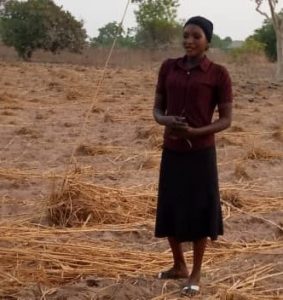
Before the 2020 farming experience, Patience Emmanuel, a farmer and mother of two in Lafia whose speciality is tomato cultivation, had plans and was hoping to save to expand her farm.
A week after she transplanted her tomato from the nursery to the main farm, the rain ceased. “There was no drop of water for a week. It affected tomatoes and the yields were very low,” Patience says.
The plot where she used to harvest between 70 to 90 baskets of tomatoes only yielded 17 baskets in 2020, as the price also crashed to a record low of between N1,800 to N1,500 due to the COVID-19 pandemic as against between N2, 500 to N3,000.
“This loss really brought down our income and the money at hand couldn’t meet the family needs,” she said.
These women need more education on climate change as much as they need the government’s intervention to continue with their farming. “We need enlightened leaders that can help us in a poor situation like this before the coming of the next planting season,” Patience pleads.
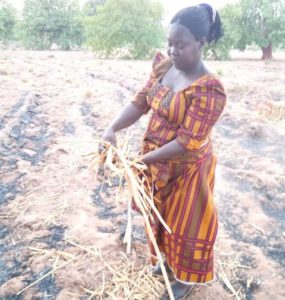
Monica Aleku whose farm is also in Lafia is mourning her loss from the 2020 farming experience, having lost more than half of the yam she planted. “After I planted my yam, the rain didn’t fall for about a couple of weeks and there was too much sun which destroyed yams in the heaps,” she recounts. “I planted up to 2000 heaps of yams but I couldn’t harvest up to 600 tubers of yam.”
According to her, sales from her annual harvest from the farm could be as much as N180,000. But now she struggles to feed her family.
A looming hunger
In 2019, 34 million people globally were acutely food insecure due to climate extremes. The UN Office for the Coordination of Humanitarian Affairs (UNOCHA) says the humanitarian impacts of climate change will be far worse in the decades to come if there are no drastic efforts to reduce greenhouse gas emissions.
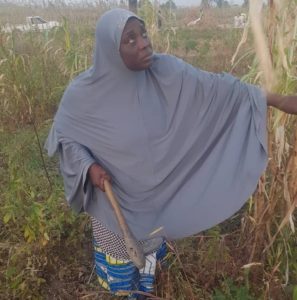
Nigeria faces a serious food crisis except the government takes necessary action, given the experiences of these women who form the fulcrum of the workforce in the agricultural sector.
The loss occasioned by these changes without adaptation could be between six per cent and 30 per cent of Nigeria’s GDP by 2050, amounting to between USD 100 billion and USD 460 billion, says the Nigerian Federal Ministry of Environment, quoting a report by the Department for International Development (DFID).
“If the government did not take necessary actions, there will be serious hunger,” Susan raises the alarm because, like her, many other women such as Zainab Isah Arah, the coordinator of Smallholder Women Farmers of Nigeria (SWOFON) in Zamfara State, have lost huge investments in farming in 2020.
After last year’s experience, as an integrated farmer, Zainab believes that climate change is already resulting in low production and food scarcity coupled with insecurity.
“Now we don’t have much to feed or meet our demand,” she says with little or no hope that things may get better as the governments are not really facing the reality.
“We are battling climate change because we experienced a delay in rainfall. There was a draught at the point we were expecting rain and about to apply fertilizer. It seriously affected all the crops,” says Zainab whose state, Zamfara, is one of the most affected by insecurity plaguing Northwest Nigeria. Her farms at Wanke, Sadau, and Mohali were most affected by both irregular rainfall and floods.
She recounted how flooding washed her beans plantation, shortly after a drought, leaving her with little to no harvest. Her loss was almost N200,000.
“For my beans last year on the same piece of the farm before the flood, I harvested 15 bags but this year due to the flood I got just seven bags.”
Like Susan and Zainab, Hajia Safiyah, whose rice farm was washed away in Lokoja, Kogi state capital, Northcentral Nigeria, after the 2020 flood, says there won’t be any food security except if the government intervenes. Her experience is not different from those of others about the irregularity of rainfall.
“About climate change, we don’t know what was happening last year to farmers. It’s not only COVID-19 that is farmers’ headache. We expected rain to start, but the rain didn’t start and we have to embark on prayers,” she says, looking dejected and hopeless.
“But when it rained it resulted in flooding in Kogi State. The floods swept away our rice farms. Even our cassava farm was flooded. There would be food crises because right now, prices of food are going up even in the so-called ‘bush markets’ in the villages. There won’t be any food security with what we are experiencing and if the government did not come to our aid.”
These women have similar expectations from their respective governments. “We expect the government to assist us with inputs since floods have carried away our farms,” Hajia Safiyah said.
Susan pleads: “The actions we farmers are looking forward to from the government is to support those of us that can do dry season farming that may help reduce hunger.
“For us in Nasarawa State, we don’t practice dry season farming very much, especially women. We are not into it,” she adds.
“That is one of our charter of demands, that, if it is possible, we want the government to give us a big plot of land that can be used as a cluster farm. If the government fulfils that, we can farm as a group.”
Building resilience of women farmers against climate change
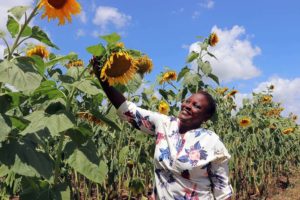
It baffles both Susan and Zainab that their knowledge of climate change did not immune them from the pangs of destruction that it visited on them.
“I had training on climate change. It’s the ecological changes that occur due to some practices,” says Zainab. She believes there should be more awareness creation and sensitisation for grassroots women about the issue.
“Now even with the advancements in the weather forecast, they are just predicting and with the prediction is there any measure on the ground for farmers in terms of information sharing, or provision of seed to aid mitigation,” she says.
Experts in climate change and agriculture believe that an adjustment to adapt to the changing situation is crucial for a country like Nigeria whose livelihood occupation of the majority of its population is subsistence farming.
Olumide Ojo, Resilience and Private Sector Engagement Manager at Oxfam Nigeria, says climate change issues are dynamic and approaches to them too have to be dynamic. To really address the problem, he argues that knowledge is what is needed for the vulnerable, particularly the women who are directly impacted by the effects of climate change.
“What is needed to fight climate change is knowledge. The traditional approach has always been to plant early maturing crops, maybe you are expecting a shorter duration of the rainfall and you want your crops to have matured before the cessation of the rainfall,” Ojo explains but adds that the knowledge has to be holistic.
“In planting early, knowledge has to be holistic. We need to push out a holistic body of knowledge on managing climate change. Planting early in itself needs a lot of education because there are false starts of rainfall.”
With the right kind of knowledge, women, according to Ojo, can harvest as much output from a small farm size as what they will get from a large farm size without knowledge.
Ojo’s position is shared by Dr Mithika Mwenda, Executive Director of the Pan African Climate Justice Alliance, who also believes that “solutions come from the people, not from protocols such as the Paris Agreement.”
Dr Mwenda says a bottom-up approach is needed to build resilience. “What works in the Netherlands, won’t necessarily work in the Horn of Africa. People have their own ways of dealing with climate change. A bottom-up approach is needed to build resilience.”
He shares how, in Kenya, his organisation and others led a local initiative in 2020 to combat climate change by introducing sunflower – a fast-maturing, drought-resistant crop in demand for edible oil.
Around 3,000 farmers were enlisted to the project, which majorly focused on women and youth.
“We provided seeds and partnered up with Kenyan Bidco Africa to guarantee a market and a fair price for farmers. In less than four months, the project has produced results beyond our expectations and some life-transforming impacts that are already visible. We just need the will, and the spirit of partnership,” he explains.
With the near non-existence of extension programmes in Nigeria, rural women farmers can do as much as the extension officers with the right kind of knowledge.
“Gone were the days when we used to see them visit us but not now, we don’t have them,” Zainab says of the non-availability of extension workers.
Even when states and federal ministries of agriculture mount programmes on television, Zainab believes such is never enough for rural women who often don’t have access to television.
“Not enough, what they show on TV how many have access to a TV? And at the grassroots, we need sensitisation and practical examples.”
Ojo says a homegrown solution to this challenge is engagement at the grassroots. “If rural women are exposed to the same knowledge that a typical extension is exposed to for the same period of time, by the time you are evaluating their performance, the difference is always insignificant.”
He argues that the farmers will understand the concept of extension from the perspective of a core practitioner rather than from the perspective of a service delivery agent that the extension officer is.
“A core farmer is combining the knowledge with the practical know-how and she understands better from that perspective. That’s what we should be targeting at the women,” he says.
How Nigeria is responding to the climate change challenge
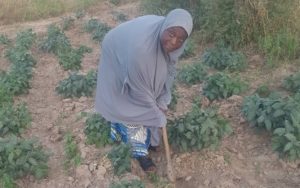
Nigeria ratified the Paris Agreement aimed at tackling climate change in 2017. Through this, it has pledged to reduce its greenhouse gas emissions by 20 per cent before 2030 when compared to “business-as-usual” levels. This pledge rises to 45 per cent on the condition of international support.
In other words, if Nigeria were to follow a “business as usual” pathway, it would expect its emissions to reach around 900 million tonnes of carbon dioxide a year by 2030, says Nigeria’s Carbon Brief profile.
Nigeria was the world’s 17th biggest emitter of greenhouse gases in 2015, the second-highest in Africa after South Africa.
While addressing the UN General Assembly in September 2019, Nigerian President Muhammadu Buhari said the country “stands resolutely with the international community in observing agreed carbon emission targets which I signed in 2015.”
“We have since issued two sovereign Green Bonds and have added an additional 1 million hectares of forested land taking our total forest coverage to 6.7 per cent through collective national effort,” he added.
In 2017, Nigeria made its climate pledge where the government committed to reducing the country’s emissions by ramping up the rollout of solar energy production, improving energy efficiency and ending “gas flaring”. But experts knock the government for not doing much to meet up with the pledge since then.
“The commitment to reducing carbon emission by the government by 2030 as captured in our NDC, that is, the Nationally Determined Contribution to the Paris Agreement, everything that we are doing seems not to go with the agreement,” says Ojo.
Not much has been developed in terms of solar power for the country and power generation and distribution have also been abysmal. In the same 2017, statistics from the Transmission Company of Nigeria, (TCN), indicated that power generation in the country dropped from 3,959 megawatts on January 4 to 2,662 megawatts on January 22. Many households are powered by generating sets that contribute to carbon emission.
Greenhouse gas emissions from fossil fuel production and use have increased by 16 per cent since 2015, according to data from the International Energy Agency (IEA), the Carbon Brief report published in August 2020 reveals.
Support for this report was provided by the Premium Times Centre for Investigative Journalism (PTCIJ)’ through funding support from Ford Foundation.
Support Our Journalism
There are millions of ordinary people affected by conflict in Africa whose stories are missing in the mainstream media. HumAngle is determined to tell those challenging and under-reported stories, hoping that the people impacted by these conflicts will find the safety and security they deserve.
To ensure that we continue to provide public service coverage, we have a small favour to ask you. We want you to be part of our journalistic endeavour by contributing a token to us.
Your donation will further promote a robust, free, and independent media.
Donate HereStay Closer To The Stories That Matter




